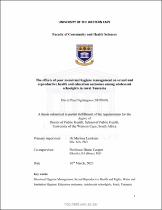| dc.contributor.advisor | Lembani, Martina | |
| dc.contributor.author | Ngilangwa, David Paul | |
| dc.date.accessioned | 2023-05-15T10:45:14Z | |
| dc.date.available | 2023-05-15T10:45:14Z | |
| dc.date.issued | 2023 | |
| dc.identifier.uri | http://hdl.handle.net/11394/9964 | |
| dc.description | Philosophiae Doctor - PhD | en_US |
| dc.description.abstract | Background: In Tanzania, 11 million children are enrolled in primary schools, half of them being girls. As the majority of girls start their menstruation while in primary school, their retention in schools is likely to be hampered by inadequate and poor menstruation hygiene management facilities. It is important to conduct research to understand the association between poor menstruation hygiene management and school absenteeism, psychological well-being, and reproductive tract infections to inform interventions and policies that may enhance the full realization of girls pursuing education successfully. Much research conducted previously has focused on the knowledge and practices of menstruation hygiene management among girls in secondary schools. There is limited evidence of the associations between menstrual hygiene management and particularly sexual and reproductive health and education outcomes, among adolescent schoolgirls in rural Tanzania | en_US |
| dc.language.iso | en | en_US |
| dc.publisher | University of the Western Cape | en_US |
| dc.subject | Menstrual Hygiene Management | en_US |
| dc.subject | Sexual Reproductive Health and Rights | en_US |
| dc.subject | Water and Sanitation Hygiene | en_US |
| dc.subject | Education outcome | en_US |
| dc.subject | Adolescent schoolgirls | en_US |
| dc.title | The effects of poor menstrual hygiene management on sexual and reproductive health and education outcomes among adolescent schoolgirls in rural Tanzania | en_US |
| dc.rights.holder | University of the Western Cape | en_US |

